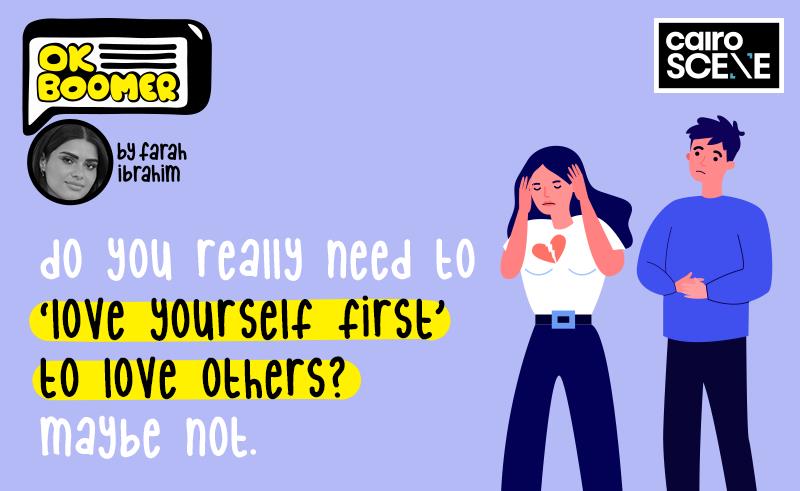Do You Really Need to ‘Love Yourself First’ to Love Others? Maybe Not.
They say to love someone else you must first love yourself, but who are they to gatekeep love like that?

In a previous edition of OK Boomer, I talked about why self-love is important for preserving our mental health, even if self-love might sound like a luxury rather than a necessity — or a new-age fad for people with too much time on their hands. This time, I want to explore the darker side of the self-love movement; the effects of the ‘love yourself first’ rhetoric on our relationships with our loved ones. Is it really necessary to truly, madly, deeply fall in love with yourself before you can love others? I think not— here’s why.
Popular wisdom tells us that healthy self-esteem is a prerequisite for a healthy relationship—that without sufficient self-love, we're not capable of truly loving others unconditionally and showing up for them in the ways we need to. While our feelings about ourselves can certainly influence our feelings about others (and vice versa), the connection is more complicated than it may seem. To speak candidly, telling people that they’re only deserving of love when they can love themselves is downright annoying. What’s more, it couldn’t be farther from the truth. Love is a basic human need. You wouldn’t tell a homeless person that they’re only deserving of shelter once they’ve learned to live without it, or tell a hungry person that they should only eat once they’ve learned how to survive solely on air. Humans are social creatures; we need to give and receive love in order to live a fulfilled life. That has very little to do with how low or high our self esteem is.
Let’s take for example familial bonds. You are born loving certain people by default, before you are even aware that you are a sentient being. You are born, your mother’s body releases oxytocin, and *boom* she loves you. Love is a hormone. Would you argue that your own mother doesn’t love you, or can’t love you properly, because she doesn’t take enough care of herself? Oftentimes the people who love hardest, and give the most to others, are actually the same people who need to love themselves a little better. Does that mean their love isn't real? Does that mean they don't deserve the love we have for them?
That isn't to imply that thoughts of worthlessness and self-hatred won't cause problems in your relationships. There is ample evidence that it might. Those who doubt their own value are likely to fear rejection and keep a close eye on their partners' conduct for signals of rejection, misinterpreting seemingly innocent actions as hostile and rejecting. People with poor self-esteem may underestimate their partner's love and have a negative perspective of their partner, possibly because they don't believe "a good person" could love them. They may also choose partners who do not treat them well in the first place.
I, myself, have been guilty of this. And if I’m being honest, it wasn’t a heightened sense of self-esteem that allowed me to stop choosing bad partners. I still have good and bad days. It was just a moment of realisation that sparked a change, which then allowed me to write down a new, improved mental list of what I need in a partner and shift my focus towards different kinds of people.
But the likelihood of your relationship succeeding based on your self-love isn’t the topic I’m discussing, it’s about shaming others, or making them feel unworthy of love because they struggle with self esteem.
The reality is that even very high self-esteem is not necessarily an asset in relationships. Dr. Juliana Breines, the author of 'In Love and War’ suggests that people with high self-esteem are more likely than others to use "exit" strategies when problems arise rather than taking more constructive approaches. And people with high self-esteem that is fragile and contingent on external validation (as self-esteem often is) are more likely to become defensive or blame others when facing their own transgressions.
In fact, sometimes the very thing that can make you love yourself more is a healthy relationship; someone who reminds you of all that is good and kind about you. When we experience healthy love, that security net our partner's presence provides can make us view ourselves with a kinder eye. Your partner's unconditional love may help you overcome your fears over the course of a relationship. You can also replace the idealised vision of your partner with a genuine one, recognising them as a flawed human being like the rest of us, and still love them, or perhaps love them even more.
It is critical that we recognise that everyone faces insecurities. In reality, it's a rare person who adores every facet of themself at all times. Growing and changing is a part of life. In the end, self-love may not be as important to relationships as we are led to believe. Mere self-acceptance, or seeing yourself as a decent person who is worthy of love without having to prove yourself, is really all it takes. Even on days when you don’t feel great about yourself, which is normal and okay, don’t fall into the trap of believing that you can only be in a relationship if your self esteem is exquisite. Nobody feels that way one hundred percent of the time, and nobody ever will.
- Previous Article Dr.Sisilove or How (Not) To Diffuse A Bomb
- Next Article Mohamed Salah Wins the PFA Fans' Player of the Year Award
Trending This Week
-
Apr 23, 2024
























